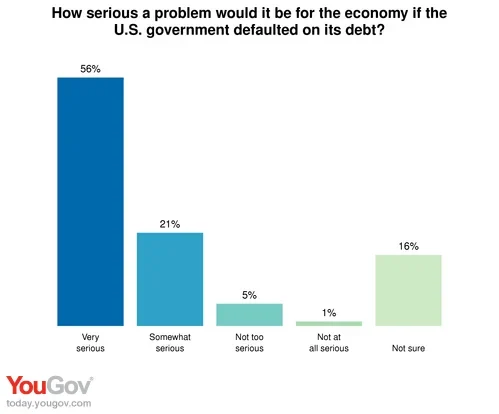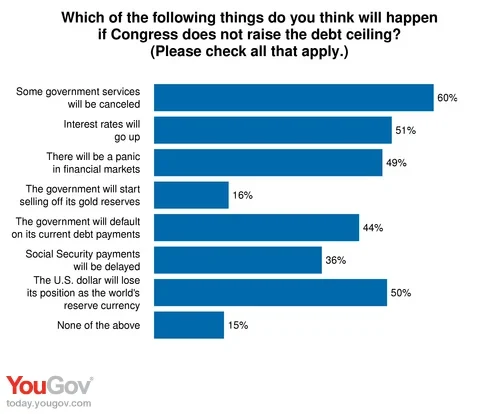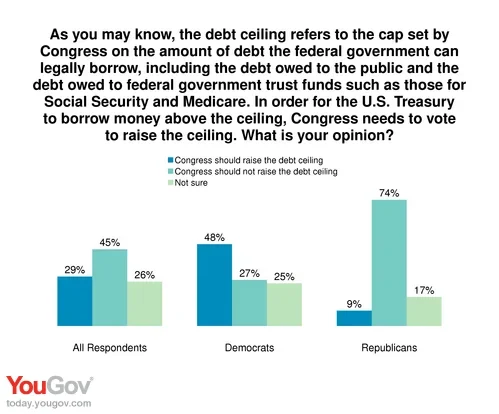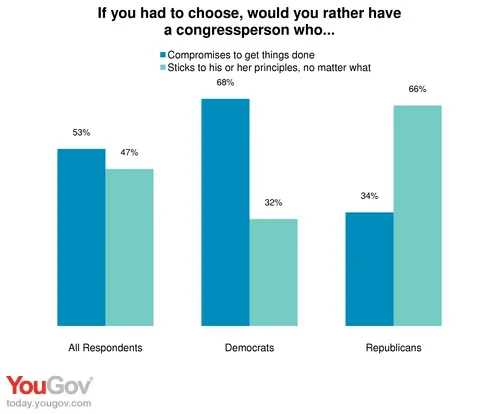Americans understand that defaulting on the U.S. debt would be a serious economic problem — 77% agree it would be in the latest Economist/YouGov Poll, and majorities of Democrats and Republicans agree on this. But dealing with the debt ceiling and a balanced budget is a different matter. Democrats and Republicans have very different ideas, with Republicans not very supportive of compromise.

Only 6% of Americans say this is not a serious economic problem. And more than half say that not raising the debt ceiling will result in canceling government services, and higher interest rates. Half say the U.S. dollar would lose its position as the world’s reserve currency. Nearly half expect a panic in financial markets. But only a third think Social Security payments would be delayed by it.

But while the parties agree on what will happen, they disagree on what to do.
• About half of Republicans want to balance the budget immediately (so do 46% of independents). But half of Democrats think this can wait a few years.
• 60% of Democrats would be willing to raise taxes to help balance the budget; just 19% of Republicans would do that
• If taxes had to be raised, 72% of Democrats (and 48% of independents) would raise them only on the wealthy; 53% of Republicans would raise them for everyone.
• 63% of Democrats would let the Bush tax cuts expire; 67% of Republicans would not.
As they always have, Americans favor a balanced budget amendment tied to hard spending caps and requiring a two-thirds vote for tax increases. Even a plurality of Democrats would go along.
But when it comes to raising the debt ceiling, the parties divide. Overall, Americans are still against it, though many are unsure. Nearly half of Democrats would raise the debt ceiling, but 74% of Republicans would not.

There may be more support for raising the debt ceiling if it becomes tied to a deficit reduction plan. But even here the parties differ. A majority of Democrats would support a plan that included tax increases, and even more Democrats would support a plan that eliminated tax breaks for the wealthy. A majority of Republicans would support raising the debt ceiling if it came along with spending cuts and just under half would support raising it if it meant cuts in entitlements. Nationally, spending cuts and eliminating tax breaks for the wealthy are the two most popular options.
Would you support or oppose an agreement to raise the debt ceiling if it were tied to a deficit reduction plan that included the following measures...?
| Percent Supporting | ||||
|---|---|---|---|---|
Tax increases | 32% | 53% | 14% | 29% |
Spending cuts | 64% | 57% | 79% | 73% |
Entitlement cuts | 34% | 24% | 48% | 40% |
Ending tax breaks for the wealthy | 55% | 73% | 35% | 58% |
than Democrats to want their representatives to stick to their positions no matter what. Americans are fairly evenly divided on the question of compromising in order to get things down, but the party difference is wide. By nearly two to one, Republicans want their representatives to stick to their principles, while by a somewhat wider margin, Democrats would want their representatives to compromise to get things done.









